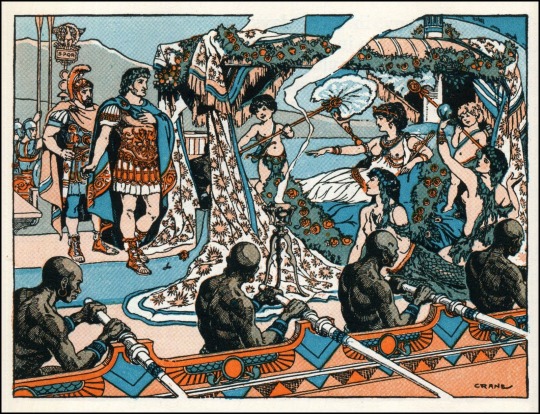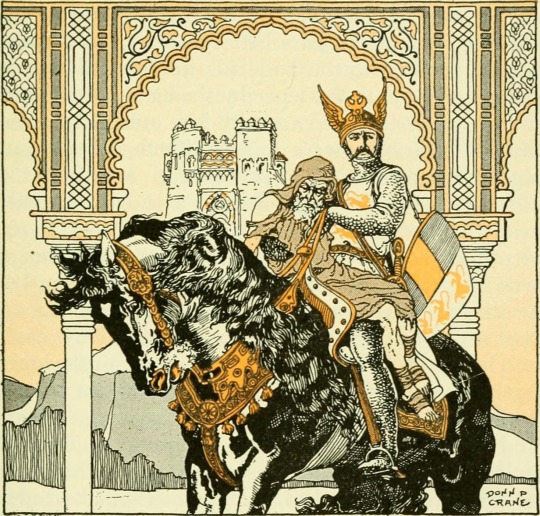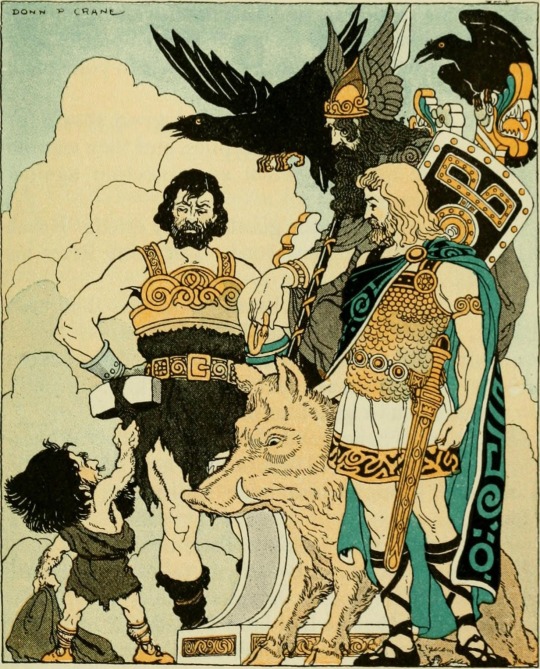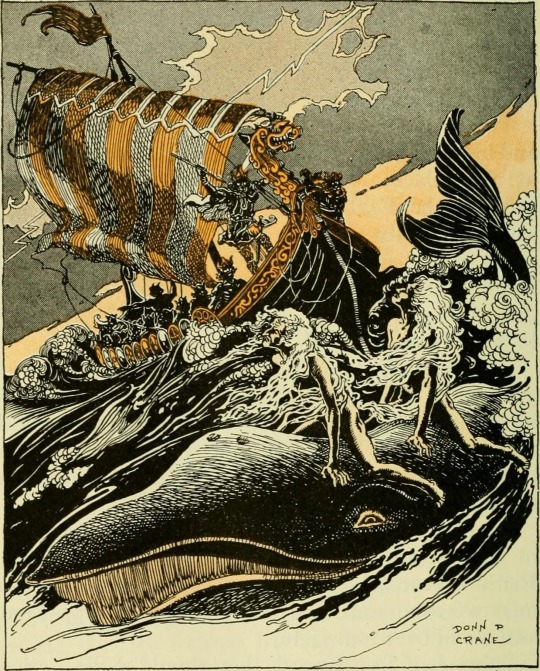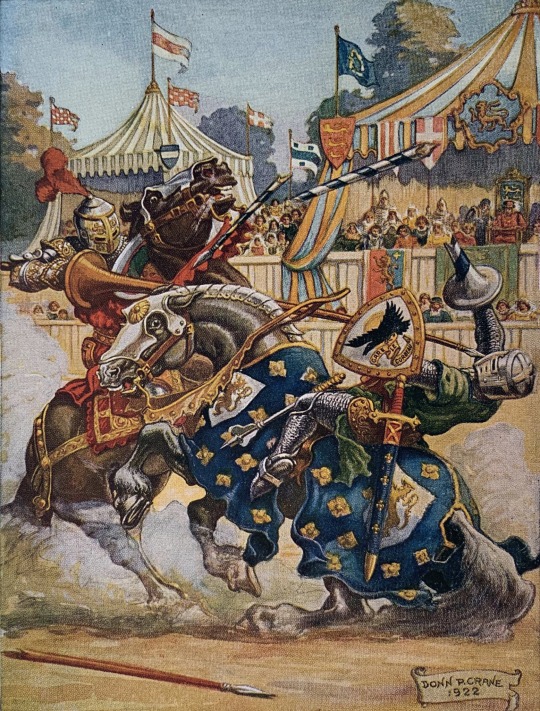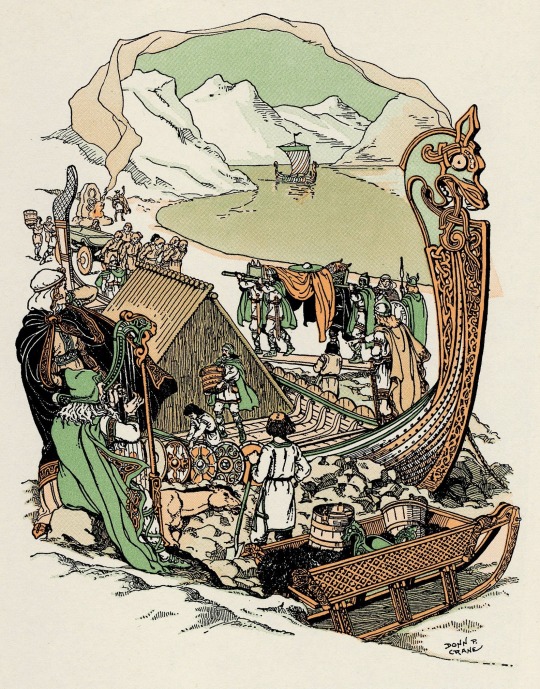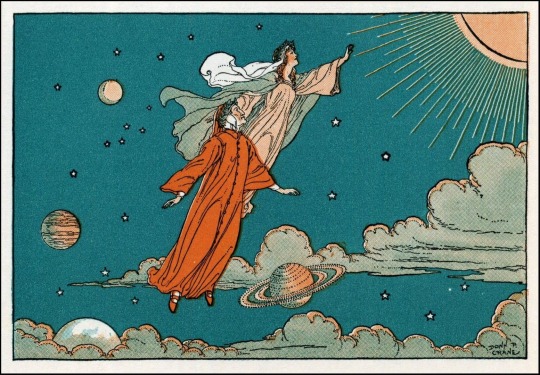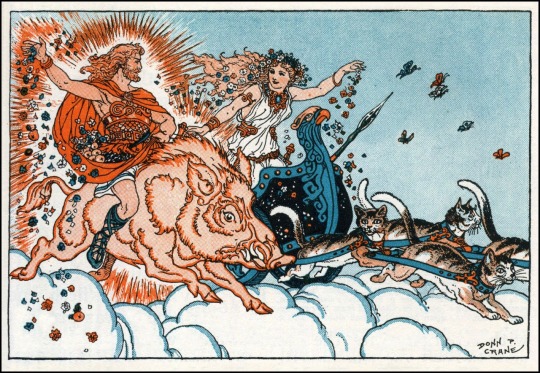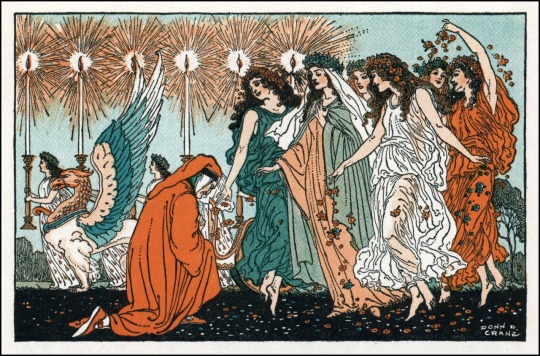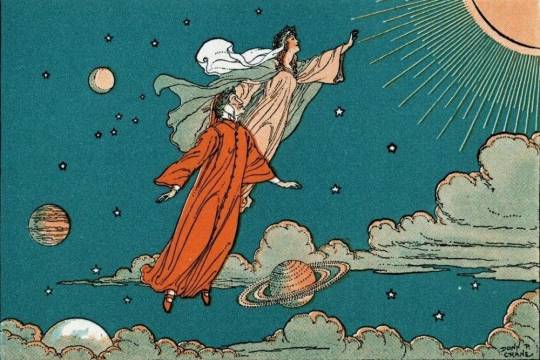#donn crane
Photo
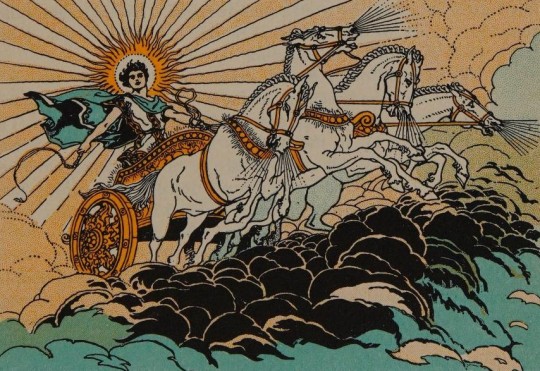
Phaeton, from Through Fairy Halls of My Bookhouse by Donn P. Crane (1925)
#donn p. crane#donn crane#donn p crane#art#illustration#golden age of illustration#1920s#1920s art#vintage art#vintage illustration#vintage#american art#american artist#books#book illustration#mythology#greek mythology#phaeton#classic art#uploads
58 notes
·
View notes
Photo
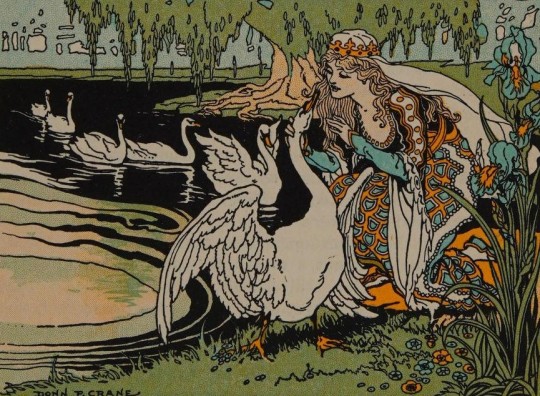
Illustration from The Six Swans for Through Fairy Halls of My Bookhouse by Donn P. Crane (1925)
#donn p. crane#art#illustration#golden age of illustration#1920s#1920s art#vintage art#vintage illustration#vintage#american art#american artist#american illustrators#books#book illustration#childrens books#fairy tale#fairy tales#fairytale art#classic art
4K notes
·
View notes
Photo
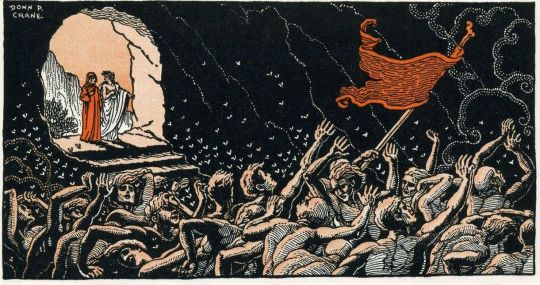
'Divine Conedy' of Dante Alighieri
Artist : Donn P. Crane
636 notes
·
View notes
Text
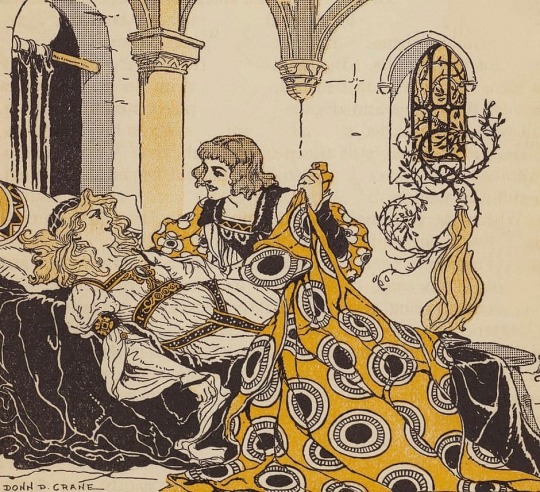
Sleeping Beauty
Artist : Donn Philip Crane
#sleeping beauty#la belle au bois dormant#children's literature#children's illustration#fairy tale#vintage illustration#old illustration#donn p. crane#colour lithograph#prince#evil spell#donn Philip Crane#castle
329 notes
·
View notes
Text

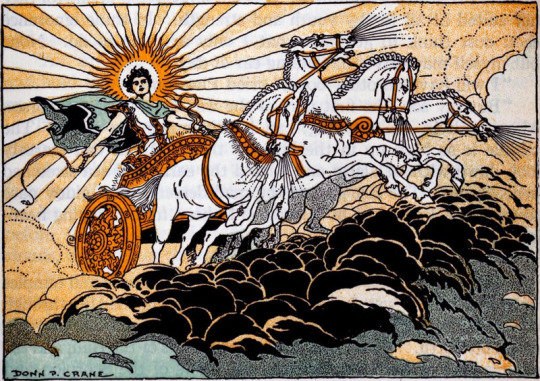
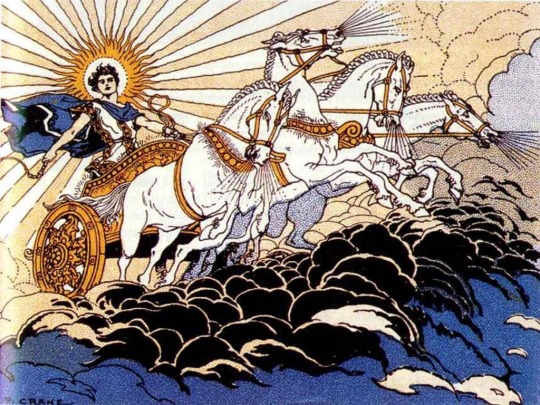
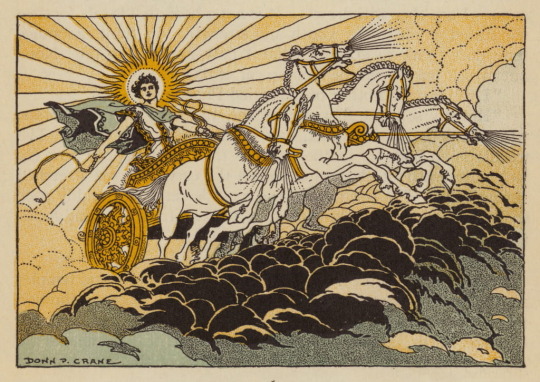
Phaethon by Donn P. Crane
#phaethon#art#donn p. crane#greek mythology#ancient greek#ancient greece#gods#greek gods#history#mythology#mythological#europe#european#religion#chariot#chariots#horses#sun
413 notes
·
View notes
Text
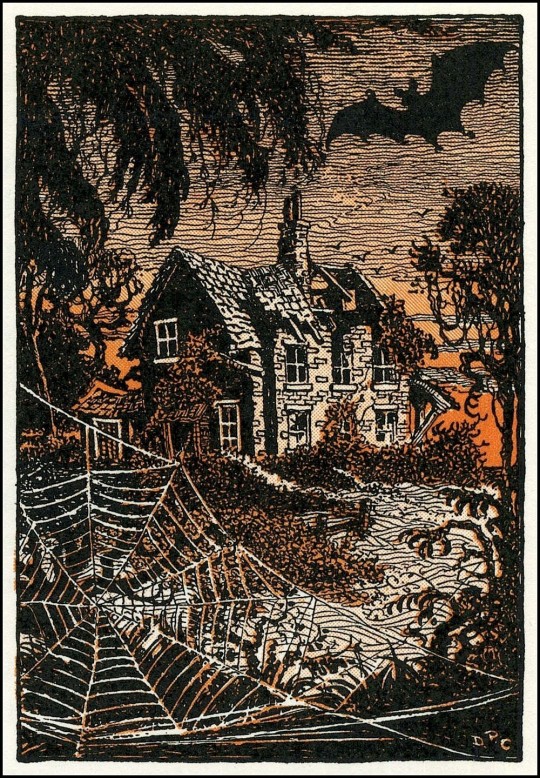
Donn P. Crane
#donn p. crane#donn p crane#halloween#halloween 🎃#vintage#halloween illustration#classic illistration#illistration#haunted house
466 notes
·
View notes
Text
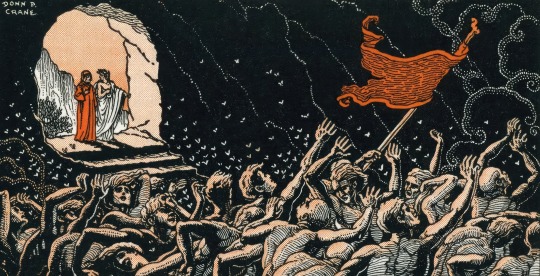

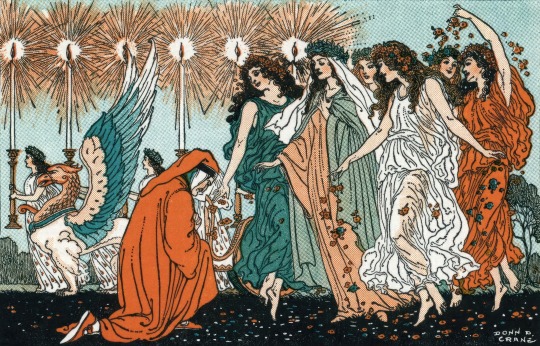

Ilustraciones para la Divina Comedia de Dante (Donn P. Crane)
#art#18-19th century art#18-19th century painting#1800s#1900s#donn p. crane#illustrations for dante’s divine comedy#🇺🇸#1866#dante alighieri#divine comedy#la divina commedia#🇮🇹
192 notes
·
View notes
Video
Land and Water by Kathie McMillan
Via Flickr:
"Science Stories Book Two" of the Curriculum Foundation Series. By Wilbur L. Beauchamp, Harriet M. Fogg, Gertrude Crampton and William S. Gray. Copyright 1935 by Scott, Foresman and Company. This series present textbooks of the highest quality, with 3 well-known artists of children's books listed as well as 2 well-known scientific illustrators. Great attention is paid to the readability levels, and the books are printed on good quality paper.
#vintage children's illustrations#vintage children's science#vintage children's natural history#1935#science#natural history#Miriam Story Hurford#Donn P. Crane#L. Kate Deal#flickr
0 notes
Text
non mais attendez parce que déjà aa dans hot ones j'avais hurlé...mais là IL EST CHEZ DAVID CASTELLO LOPES ??? JE VAIS PETER MON CRANE!!!! C'EST DIEU QUI DONNE!!!!!!
25 notes
·
View notes
Text
THIS DAY IN GAY HISTORY
based on: The White Crane Institute's 'Gay Wisdom', Gay Birthdays, Gay For Today, Famous GLBT, glbt-Gay Encylopedia, Today in Gay History, Wikipedia, and more … February 25




1937 – Severo Sarduy, born in Camagüey, Cuba (d.1993) was a Cuban poet, author, playwright, and critic of Cuban literature and art.
He went to Havana in the mid-1950s to study medicine. Though he did not finish his studies, he retained a lifelong interest in science. While living in the capital he pursued his vocation for poetry and painting and came into contact with older writers such as José Rodríguez Feo and José Lezama Lima.
With the advent of the revolution in 1959, Sarduy became one of a group of young writers given the task of renewing Cuban literature. Sent to Paris by the government in 1960 to study art at the École du Louvre, Sarduy decided not to return to Cuba when his scholarship ran out a year later. Disaffected with Castro's regime and fearful of its persecution of homosexuals and the censorship imposed on writers, Sarduy never went home.
In Paris, he was connected to the group of intellectuals who produced the magazine Tel Quel, particularly to philosopher François Wahl, with whom he was openly involved.
Sarduy worked as a reader for Editions du Seuil and as editor and producer of the Radiodiffusion-Télévision Française.
In 1972 his novel Cobra won him the Medici Prize. He was among the most brilliant essayists writing in Spanish and "a powerful baroque narrator, full of surprising resources.".
As a poet, he was considered one of the greatest of his time. He was also a more or less secret painter; a major retrospective of his work was held at the Reina Sofía Museum of Madrid after his death. He died due to complications from AIDS just after finishing his autobiographical work Los pájaros de la playa.
Sarduy's posthumous Pájaros de la playa (1993; "Beach Fowl") is about a sanatorium for sufferers of AIDS, the disease that killed the author.


1942 – John Saul is an American author of suspense and horror novels. Most of his books have appeared on the New York Times Best Seller List.
Born in Pasadena, Saul grew up in Whittier, California. He went on to several colleges, variously majoring in anthropology, liberal arts and theater, but never obtained a degree. After leaving college, Saul decided to become a writer, and spent fifteen years working in various jobs while trying to improve his craft.
Prior to the start of his bestselling thriller career Saul had around ten books published under pen names, the first of which he wrote in one weekend after unexpectedly losing his job. His first book sale earned him just $200. Today he has over 60 million books in print.
In 1976, Dell Publishing contacted him and asked if he'd be interested in writing a psychological thriller. The resulting novel, Suffer the Children, appeared on all the bestseller lists in the United States and reached the number one spot in Canada. Cry for the Strangers was made into a film of the same name in 1982.
In addition to his novels, Saul has had several one-act plays produced in both Los Angeles and Seattle.
Saul lives part-time in the Pacific Northwest, both in Seattle and in the San Juan Islands, and has a residence on the Big Island of Hawaii. Saul is openly gay. He lives with his partner of 32 years, who has collaborated on several of his novels. He is a frequent speaker at the Maui Writers' Conference.

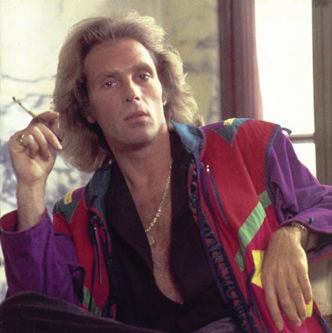
1947 – Jorge Donn was an internationally-known ballet dancer. (d.1992) He was best known for his work with the Maurice Béjart's Ballet company, and his participation as lead dancer in Claude Lelouch's film Les Uns et les Autres.
Jorge Donn was born in Buenos Aires, Argentina. He began to dance when he was 4 or 5 years old, then studied at the Colon Theatre school. In 1963, he arrived in Brussels to work in the Maurice Béjart company and soon became its principal dancer, entering into a twenty-year professional and personal relationship with Béjart.
Many of Béjart's works were created expressly for him: Bhakti (1968), Nijinsky, Clown of God (1971), Golestan, or The garden of roses (1973), Ce que l'amour me dit (1974), Notre Faust (1975), Léda (1978), Adagietto (1981) and others.
In 1976, Jorge Donn became artistic director of the Béjart's Ballet of the Twentieth Century company. In 1988, he founded his own company, L'Europa Ballet, which existed for a short time.
Jorge Donn died of AIDS on 30th November 1992 in Lausanne. Many choreographers created ballets as a tribute to him: Maurice Béjart (Ballet for Life), Denys Ganio (Tango... a rose for Jorge Donn), Carolyn Carlson (Homage for Jorge Donn), Grazia Galante (Masticando Sueños)


1950 – The Irish director Neil Jordan was born today. An Academy award-winning Irish filmmaker and novelist. He received the Academy Award for The Crying Game. As a writer/director, Jordan has a highly idiosyncratic body of work, ranging from mainstream hits like Interview With the Vampire to commercial failures like We're No Angels to a variety of more personal, low-budget art-house pictures.
Although in a conventional heterosexual marriage, unconventional sexual relationships are a recurring theme in this gay-friendly director's work, and he often finds a sympathetic side to characters audiences would traditionally consider deviant or downright horrifying. His film The Miracle, for instance, followed two characters who struggled to resist a strong, incestuous attraction, while The Crying Game made complicated, likable characters out of an IRA terrorist and a Transgendered woman. Vampire, like the Anne Rice book it was based on, focused on the intense sexual relationship of two undead men who murder humans nightly (although the pair never have sex, they are clearly lovers of a sort), accompanied by an equally lusty vampire woman who is eternally trapped in the body of a little girl. While Lestat (Tom Cruise) is depicted in an attractive but villainous manner, his lover Louis (Brad Pitt) and the child vampire Claudia (Kirsten Dunst) are meant to capture the audience's sympathy despite their predatory nature.

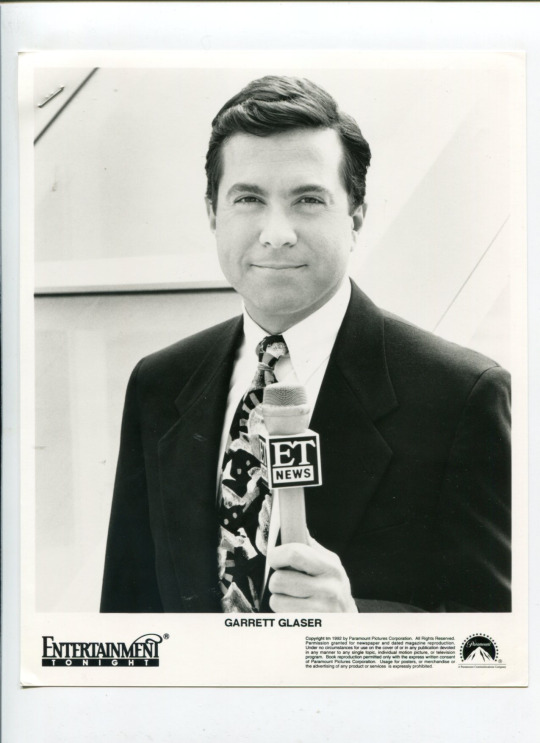
1953 – Garrett Glaser is a retired news reporter who was one of the first US television journalists to "come out" publicly as a homosexual.
His coming out occurred during the course of a speech he made before a large group of TV and radio executives at the 1992 convention of the Radio/TV News Directors Association being held in San Antonio, Texas. Although Glaser co-founded the Electronic Media Task Force of the National Lesbian/Gay Journalists Association (NLGJA) in 1990 and was later out, as well, to fellow journalists, he was not out to the public at large. That changed in 1994, when Glaser disclosed his sexual orientation during a live report on the "Channel 4 News" at KNBC-TV Los Angeles as he was reporting on the death of Elizabeth Glaser (no relation), an AIDS activist who founded the Pediatric AIDS Foundation.
Several weeks later, the Los Angeles Times published a story on the front page of its "Calendar" section about Glaser's status as one of the nation's few openly gay TV reporters.

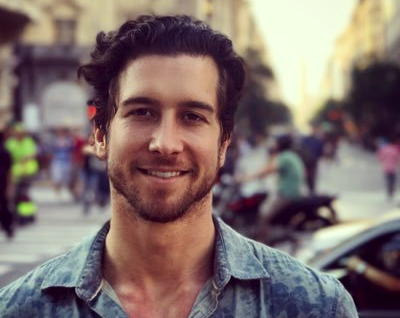
1989 – Evan Todd is an American actor and producer.
Todd grew up in Kissimmee, Florida. He finished his senior year of high school at the North Carolina School of the Arts in Winston-Salem and later graduated from the Juilliard School. Todd also studied at Yale School of Drama and London Academy of Music and Dramatic Art.
In 2007, Todd made his big screen debut as a student in the 2007 film Sydney White. He subsequently appeared in several television films and series such as Grumpy Cat's Worst Christmas Ever (2014), Switched at Birth and Jane the Virgin. In 2014, he originated the role of Kurt Kelly in Heathers: The Musical, when the rock musical had a production Off-Broadway. The following year, Todd co-produced the 2015 Broadway revival of Spring Awakening. A critical success, the rock musical, based on the German play Spring Awakening (1891) by Frank Wedekind, was nominated for both a Tony Award and a Drama Desk Award for Outstanding Revival of a Musical.
In 2016, Todd had a leading role in the comedy film 4th Man Out about a young mechanic who comes out to his straight buddies and to his family. The film received the Audience Choice Award for Best Dramatic Feature at Outfest, and was awarded the Audience Award for Best Narrative Feature at the InsideOut LGBT Film Festival. In March 2017, Todd joined the Broadway cast of Beautiful: The Carole King Musical as King’s songwriter first husband and writing partner Gerry Goffin.
Todd is openly gay. He is the co-founder of stART and artsINSIDEOUT, two summer arts empowerment programs benefiting students from his home town as well as children affected by HIV in South Africa.


2000 – On this date Henry Stuart Matis walked up to the steps of a Mormon church in Los Altos with a note reading "Do not resuscitate" pinned to his shirt, and shot himself.
He was a 32-year-old Gay man and devoted member of the The Church of Jesus Christ of Latter-day Saints, and after a lifetime spent struggling to reconcile the two, explained in a suicide note that "for the first time in over 20 years, I am free from my pains."
"As I believed that I was a Christian, I believed that I could never be Gay," he wrote. "Perhaps my death ... might become the catalyst for much good ... Your actions might help to save many young people's lives."
In the early morning, on the 10th anniversary of Matis' death, a group of local Mormons and others held a memorial vigil for Matis in Los Altos. Starting at Cuesta Park with songs and brief speeches, about 20 people then walked up Grant Road, carrying roses and candles. They ended up on the sidewalk in front of the LDS stake center on Grant Road in Los Altos, where they set up a small memorial display with an image of Matis' tombstone and stories about him and other Gay Mormons who have committed suicide.
Matis' body was found at the center, which serves as the headquarters for South Bay Mormon congregations, at about 7:30 a.m. on Feb. 25, 2000. Robert Rees of the Santa Cruz stake, who served as a spiritual adviser to Matis, said the event was meant "to honor a good man who eft life much earlier than he should have, whose passing was tragic but whose message was one of hope to other people." According to a statement on its Web site, the Mormon church believes that acting on "same-gender attraction" is a sin and Gay church members must remain celibate.
George Cole, a San Francisco resident who is Gay and serves on the executive committee of Affirmation, a support and advocacy group for Gay and Lesbian current and former Mormons, said he didn't know Matis personally but has "lost too many very good friends to suicide. "I know what it is like to seriously consider taking your life," he said. Cole said he left the Mormon church in 2002.
"I chose happiness and fulfillment at the cost of not having the church in my own life," he said. Matis died just a couple of weeks before Proposition 22, the anti-Gay marriage measure in 2000 that preceded 2008's Proposition 8, went before voters, and his death was often portrayed as a political statement, though Matis did not mention the initiative in his suicide note.

2007 – On this date the 79th Academy Awards were hosted by Ellen DeGeneres in Hollywood.



16 notes
·
View notes
Photo
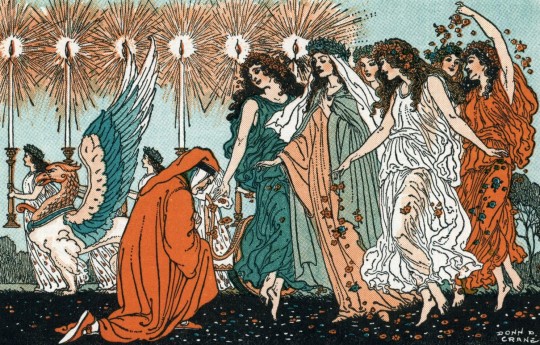
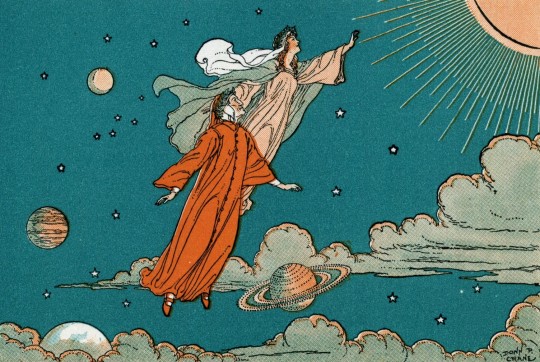
Illustrations from Dante’s The Divine Comedy by Donn P. Crane
#donn p. crane#art#illustration#golden age of illustration#1920s#1920s art#vintage art#vintage illustration#vintage#american art#american artist#american illustrators#books#book illustration#childrens books#dante alighieri#divine comedy#classic art
3K notes
·
View notes
Note
Hi! I have to recite 6-8 lines of poetry for my drama class, but I don’t have any ideas. I know this blog has reblogged some poetry and people have sent asks with poetry, so could you or anyone who sees this suggest some good poetry? It has to be something you can say with full commitment and passion.
Ho for sure! Once I had to do a similar thing for a class, by giving a "gift" and my gift was Wendy Cope's The Orange, since it is one of my favourites.
Others of my favourites include Victor Hugo's Melancholia, Laura Gilpin's The Two Headed Calf, Stephen Crane's In The Desert, Meggie Royer's The Morning After I Killed Myself (poems under the cut)
If you want some more I recommend you check out @poetrysmackdown @apoemaday @havingapoemwithyou
The Orange by Wendy Cope
At lunchtime I bought a huge orange -
The size of it made us all laugh.
I peeled it and shared it with Robert and Dave -
They got quarters and I got a half.
And that orange, it made me so happy,
As ordinary things often do
Just lately. The shopping. A walk in the park.
This is peace and contentment. It's new.
The rest of the day was quite easy.
I did all the jobs on my list
And enjoyed them and had some time over.
I love you. I'm glad I exist.
Melancholia by Victor Hugo (extract)
Où vont tous ces enfants dont pas un seul ne rit ?
Ces doux êtres pensifs que la fièvre maigrit ?
Ces filles de huit ans qu’on voit cheminer seules ?
Ils s’en vont travailler quinze heures sous des meules ;
Ils vont, de l’aube au soir, faire éternellement
Dans la même prison le même mouvement.
Accroupis sous les dents d’une machine sombre,
Monstre hideux qui mâche on ne sait quoi dans l’ombre,
Innocents dans un bagne, anges dans un enfer,
Ils travaillent. Tout est d’airain, tout est de fer.
Jamais on ne s’arrête et jamais on ne joue.
Aussi quelle pâleur ! la cendre est sur leur joue.
Il fait à peine jour, ils sont déjà bien las.
Ils ne comprennent rien à leur destin, hélas !
Ils semblent dire à Dieu : « Petits comme nous sommes,
Notre père, voyez ce que nous font les hommes ! »
O servitude infâme imposée à l’enfant !
Rachitisme ! travail dont le souffle étouffant
Défait ce qu’a fait Dieu ; qui tue, œuvre insensée,
La beauté sur les fronts, dans les cœurs la pensée,
Et qui ferait — c’est là son fruit le plus certain ! -
D’Apollon un bossu, de Voltaire un crétin !
Travail mauvais qui prend l’âge tendre en sa serre,
Qui produit la richesse en créant la misère,
Qui se sert d’un enfant ainsi que d’un outil !
Progrès dont on demande : « Où va-t-il ? que veut-il ? »
Qui brise la jeunesse en fleur ! qui donne, en somme,
Une âme à la machine et la retire à l’homme !
Que ce travail, haï des mères, soit maudit !
Maudit comme le vice où l’on s’abâtardit,
Maudit comme l’opprobre et comme le blasphème !
O Dieu ! qu’il soit maudit au nom du travail même,
Au nom du vrai travail, sain, fécond, généreux,
Qui fait le peuple libre et qui rend l’homme heureux !
English translation by Geoffrey Barto
[Where do these children go for whom nobody laughs?
These sweet, pensive beings wasted away by fever?
These eight-year-old girls you see walking alone?
They go to work — fifteen hours in the mill;
They go from dawn to dusk, eternally repeating
The same motions in the same prison.
Stooped beneath the teeth of a somber machine,
A hideous monster that chews who-knows-what in the shadows,
Innocents on the chain gang, angels in some hell,
They work. Everything is bronze, all is iron.
Never do they stop and never do they play.
And what paleness! Ash upon their cheeks.
Barely it is dawn, already they are tired.
They understand nothing of their fate, alas!
They seem to say to God: “Little as we are,
Our Father, look what the men do to us!”
O infamous servitude imposed upon the child!
Stunting! work whose stifling breath
Undoes what God has made; that kills, senseless work,
The beauty of their faces, the thought in their heads,
And which would make — here’s its most certain fruit! -
A hunchback of Apollo, a cretin of Voltaire!
Evil work that takes tender youth in its grasp,
That produces wealth by creating misery,
That uses a child like one more tool!
Progress of which we ask: “Where are you going? What do you want?”
That breaks youth in bloom! that gives, in sum,
A soul to a machine and yanks it from a man!
That this work, hated by mothers, be cursed!
Cursed as a degenerative vice!
Cursed as damnable, cursed as blasphemy!
O God! be it cursed even in the name of work,
In the name of true work, healthy, fecund, generous,
That makes the people free and makes man happy!]
The Two-headed Calf by Laura Gilpin
Tomorrow when the farm boys find this
freak of nature, they will wrap his body
in newspaper and carry him to the museum.
But tonight he is alive and in the north
field with his mother. It is a perfect
summer evening: the moon rising over
the orchard, the wind in the grass. And
as he stares into the sky, there are
twice as many stars as usual.
In The Desert by Stephen Crane
In the desert
I saw a creature, naked, bestial,
Who, squatting upon the ground,
Held his heart in his hands,
And ate of it.
I said, “Is it good, friend?”
“It is bitter—bitter,” he answered;
“But I like it
“Because it is bitter,
“And because it is my heart.”
The Morning After I Killed Myself by Meggie Royer
The morning after I killed myself, I woke up.
I made myself breakfast in bed.
I added salt and pepper to my eggs and used my toast for a cheese and bacon sandwich.
I squeezed a grapefruit into a juice glass.
I scraped the ashes from the frying pan and rinsed the butter off the counter.
I washed the dishes and folded the towels.
The morning after I killed myself, I fell in love.
Not with the boy down the street or the middle school principal.
Not with the everyday jogger or the grocer who always left the avocados out of the bag.
I fell in love with my mother and the way she sat on the floor of my room holding each rock from my collection in her palms until they grew dark with sweat.
I fell in love with my father down at the river as he placed my note into a bottle and sent it into the current.
With my brother who once believed in unicorns but who now sat in his desk at school trying desperately to believe I still existed.
The morning after I killed myself, I walked the dog.
I watched the way her tail twitched when a bird flew by or how her pace quickened at the sight of a cat.
I saw the empty space in her eyes when she reached a stick and turned around to greet me so we could play catch but saw nothing but sky in my place.
I stood by as strangers stroked her muzzle and she wilted beneath their touch like she did once for mine.
The morning after I killed myself, I went back to the neighbors’ yard where I left my footprints in concrete as a two year old and examined how they were already fading.
I picked a few daylilies and pulled a few weeds and watched the elderly woman through her window as she read the paper with the news of my death.
I saw her husband spit tobacco into the kitchen sink and bring her her daily medication.
The morning after I killed myself, I watched the sun come up. Each orange tree opened like a hand and the kid down the street pointed out a single red cloud to his mother.
The morning after I killed myself, I went back to that body in the morgue and tried to talk some sense into her.
I told her about the avocados and the stepping stones, the river and her parents.
I told her about the sunsets and the dog and the beach.
The morning after I killed myself, I tried to unkill myself, but couldn’t finish what I started.
13 notes
·
View notes
Text
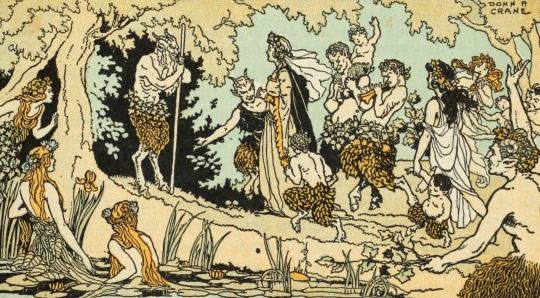
From the Tower Window of my Bookhouse
Edoted by Olive Beaupré Miller
Chicago, the Bookhouse for Children Publishers
1921
Artist : Donn Philip Crane
Far away within the wood a troop of Fauns and Sa’tyrs were dancing in a round, while old Syl-va’nus, who was their king, slept in a shady arbor. Gay, rustic, wild-wood folk were these, with horns upon their foreheads and shaggy legs of goats.
#donn philip crane#donn p. crane#1921#children's literature#children's books#fairy story#vintage illustration#children's book#old illustration#fairy#water nymph#fauns#faune#nymphe#olive beaupré miller#from the tower window of my bookhouse#golden age of illustration
420 notes
·
View notes
